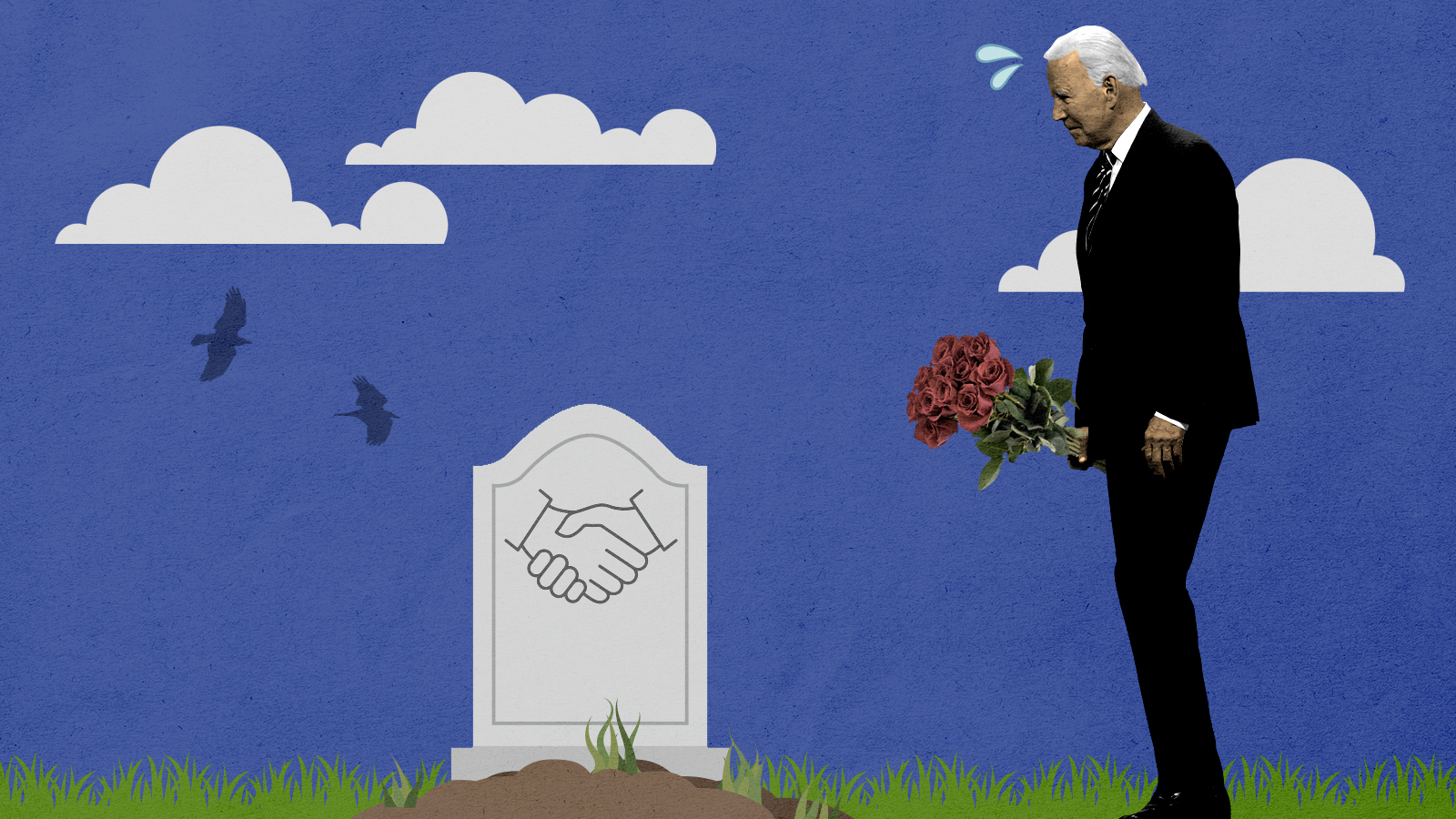Biden's bill isn't a celebration of bipartisanship. It's the funeral.


A free daily email with the biggest news stories of the day – and the best features from TheWeek.com
You are now subscribed
Your newsletter sign-up was successful
When President Biden signs the infrastructure bill into law on Monday, it will be pitched to the public as a bipartisan accomplishment. In fact, the bill is probably the dying gasp of cross-party cooperation for the foreseeable future.
The hints are already there. Senate Minority Leader Mitch McConnell (R-Ky.) helped pass the bill, but he will skip the signing ceremony on Monday. The bill might bring some dollars home to Kentucky — and probably averted the destruction of the filibuster — but McConnell won't allow himself to be seen on camera cooperating with a Democratic president. Politics is politics.
But Mitch's absence isn't that big a deal. It's more alarming that House Republicans who voted for the bill are under fierce attack from their conservative colleagues, denounced as traitors. Rep. Fred Upton (R-Mich.) has received death threats for his "yes" vote. Congressional Republicans are talking about stripping committee assignments from the 13 GOP lawmakers who supported the legislation — or perhaps simply running primary election challenges against them. Some conservatives have even suggested House Minority Leader Kevin McCarthy (R-Calif.) should lose his leadership status for allowing the defections.
The Week
Escape your echo chamber. Get the facts behind the news, plus analysis from multiple perspectives.

Sign up for The Week's Free Newsletters
From our morning news briefing to a weekly Good News Newsletter, get the best of The Week delivered directly to your inbox.
From our morning news briefing to a weekly Good News Newsletter, get the best of The Week delivered directly to your inbox.
This isn't a principled attack by Republicans on infrastructure: President Trump tried and failed to pass a similar bill. It's an attack on bipartisanship itself.
And that makes Biden's bipartisan infrastructure victory somewhat less victorious. After all, the point of the bill was never the infrastructure — Democrats simply could have rolled that stuff into the reconciliation bill and passed it without a single GOP vote. The point was the bipartisanship, an effort to make good on Biden's campaign promise to heal "the soul of the nation." If Democrats and Republicans could still come together on legislation the country needs, it would be proof that the American experiment isn't utterly broken, that democracy still has a chance.
"Here on this bill, we've proven that we can still come together to do big things — important things — for the American people," Biden said in August, after the Senate passed its version of the bill.
And it worked. This time. But the aftermath has been brutal, and the Republicans who now find their seats and even their very lives endangered for crossing the aisle probably will be less inclined to repeat their offenses against party orthodoxy anytime soon. You can't have cooperation if one side is dead set against it. Which means Monday's signing ceremony isn't really a celebration of bipartisanship. More likely, it's a funeral.
A free daily email with the biggest news stories of the day – and the best features from TheWeek.com
Joel Mathis is a writer with 30 years of newspaper and online journalism experience. His work also regularly appears in National Geographic and The Kansas City Star. His awards include best online commentary at the Online News Association and (twice) at the City and Regional Magazine Association.
-
 The Olympic timekeepers keeping the Games on track
The Olympic timekeepers keeping the Games on trackUnder the Radar Swiss watchmaking giant Omega has been at the finish line of every Olympic Games for nearly 100 years
-
 Will increasing tensions with Iran boil over into war?
Will increasing tensions with Iran boil over into war?Today’s Big Question President Donald Trump has recently been threatening the country
-
 Corruption: The spy sheikh and the president
Corruption: The spy sheikh and the presidentFeature Trump is at the center of another scandal
-
 House votes to end Trump’s Canada tariffs
House votes to end Trump’s Canada tariffsSpeed Read Six Republicans joined with Democrats to repeal the president’s tariffs
-
 How are Democrats trying to reform ICE?
How are Democrats trying to reform ICE?Today’s Big Question Democratic leadership has put forth several demands for the agency
-
 Big-time money squabbles: the conflict over California’s proposed billionaire tax
Big-time money squabbles: the conflict over California’s proposed billionaire taxTalking Points Californians worth more than $1.1 billion would pay a one-time 5% tax
-
 The ‘mad king’: has Trump finally lost it?
The ‘mad king’: has Trump finally lost it?Talking Point Rambling speeches, wind turbine obsession, and an ‘unhinged’ letter to Norway’s prime minister have caused concern whether the rest of his term is ‘sustainable’
-
 Did Alex Pretti’s killing open a GOP rift on guns?
Did Alex Pretti’s killing open a GOP rift on guns?Talking Points Second Amendment groups push back on the White House narrative
-
 Is Alex Pretti shooting a turning point for Trump?
Is Alex Pretti shooting a turning point for Trump?Today’s Big Question Death of nurse at the hands of Ice officers could be ‘crucial’ moment for America
-
 Washington grapples with ICE’s growing footprint — and future
Washington grapples with ICE’s growing footprint — and futureTALKING POINTS The deadly provocations of federal officers in Minnesota have put ICE back in the national spotlight
-
 Halligan quits US attorney role amid court pressure
Halligan quits US attorney role amid court pressureSpeed Read Halligan’s position had already been considered vacant by at least one judge
